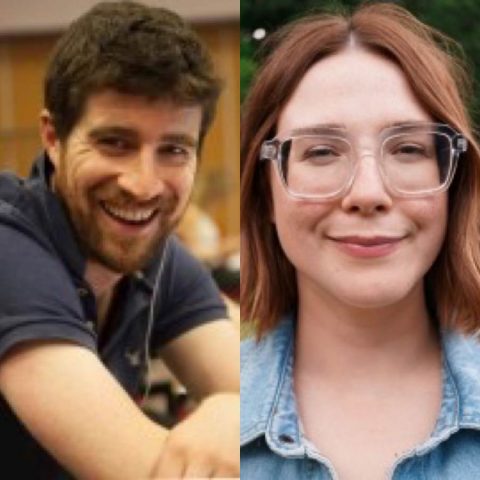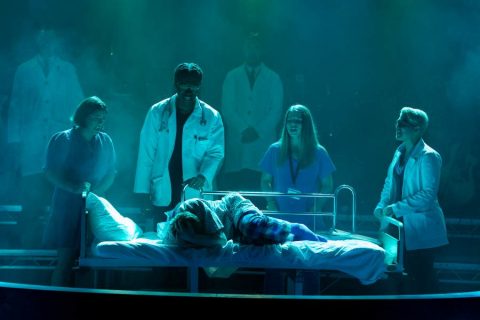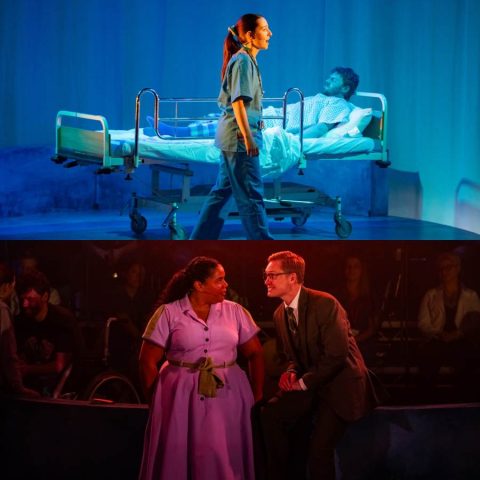
“The number of effective antibiotics to treat him keeps decreasing....With every infection his lung function is getting worse and worse.”
Such is the plight at the center of Lifeline, the new musical playing the Alice Griffin Jewel Box Theatre at the Pershing Square Signature Center through September 28th, which explores humanity in healthcare through the lens of antimicrobial resistance and the growing threat it poses to both the medical field and the world at large.
The narrative sees physician Alexander Fleming’s discovery of penicillin in 1928 – wherein he warns the world that excessive distribution of the drug could destroy its effectiveness – intertwined with the present-day story of doctor Jess Irvine, tending to friend and former fling, Aaron – who’s been diagnosed with cancer and is desperate to return to normal life – grappling with complicity in a medical system that promotes overuse, when her patient takes a turn for the worse.
Utilizing a chorus of 57 rotating real-life healthcare professionals, who, like the one above, recount their own stories & experiences with patients, alongside the principal cast, the show lays a foundation for forging on with hope, resilience, and the courage to “climb on higher” despite what diagnosis lies ahead… while also aiming to raise awareness of this urgent issue, linked to almost 5 million deaths per year.
To gain a better sense of what’s at stake, we sat down with bookwriter Becky Hope-Palmer and lyricist Robin Hiley to discuss the impact of their play, its development as a musical, and where they go from here – on the local level, in terms of their work, and, in a larger sense, medically and medicinally.
Have a look at their answers below!
Can you speak a bit about the history of the piece? What was the inspiration behind pursuing this topic? What about it spoke to you personally?

Robin Hiley, Lyricist: I was approached by Dr. Meghan Perry, an infectious diseases doctor in Edinburgh who had worked with my [doctor] wife, and who knew about [LIFELINE producer] Charades Theatre Company’s origin and [former] work [It’s a company for which I am also Artistic Director and CEO]. She pitched the idea of a musical about the biggest global threat to public health that nobody knows about: antimicrobial resistance (AMR).
I was initially rather skeptical of the idea, but after a little reading around the subject – both in terms of the history as well as the stark present-day realities – I was hooked!
Since the [initial writing], the project has continued to grow, from two sold-out runs at the world-famous Edinburgh Fringe Festival [in 2018 and 2022], to a [major city tour] including [cities such as] London, Glasgow, Atlanta, and Washington DC under its previous title, and now its off-Broadway debut in New York City at Signature Theatre. Of course, as the show has built a community of followers over the years, my colleagues and I have heard countless personal stories of the way AMR has impacted on people’s lives which has been a real inspiration and impetus. That’s just as important.
How was this musical received in Edinburgh? What was the impetus behind bringing it to New York? Given that Fleming is based in Scotland and the piece is peppered with Scottish undertones, does the reaction vary? Is there a certain reaction you’re aiming for in injecting the Scottish elements into the piece?
Hiley: There is no bigger stage for a musical than Broadway... and we’re pretty close now!! (laughs) I wouldn’t have dared to have said that Lifeline could be running in New York City five years ago, especially given everything that was going on, but each of the show’s sold-out successes have broadened horizons, and now… here we are!
Another important reason we have chosen this moment to be here in New York: the High-Level Meeting at the United Nations General Assembly will focus on AMR, and the threat it poses to global health. We are working with the United Nations to not only bring global leaders and policy makers to the theatre to see the show, but also hopefully feature a song from the show at the United Nations.
Becky Hope-Palmer, Bookwriter: When writing this version of the show, we were very conscious of appealing to an international audience, especially through the use of the more general medical terminology. But yes, a lot of the play – particularly in the modern storyline – is set in Scotland... we haven’t shied away from that, especially in terms of dialect and music style. I hope it gives them a flavor of Scotland, even if they don’t understand every single reference!
Hiley: And to remember, too: yes, it has an intrinsically Scottish sound to it that musically ties together the two timelines, but take away the fiddle and whistle, and they’re just a bunch of songs telling human stories that hopefully will continue to appeal to a wide audience.
How has the piece changed from Edinburgh to now? Was there anything added between productions? How much research went into this project between the productions?

Hiley: If we compare what’s happening onstage at Signature to what first went onstage at the Edinburgh Fringe Festival... there’s essentially nothing left [from that piece]! (laughs).
Hope-Palmer: (Laughs) Yes, the piece is very different now. I was actually brought on board to rewrite this version of the script, post-Edinburgh. Originally, the story was mainly a biopic of Fleming’s life, his [time] with the Scottish regiment, the Great War and then his discovery and subsequent ambassadorship of penicillin.
We still follow his story [in this version] but in a non-linear fashion, whilst running along a secondary storyline set in the modern day. We couldn’t help but take influence from the incredible community of healthcare professionals we have been so lucky to know through this project. They are on the frontline every day, fighting against antibacterial resistance and so, to personify them through the character of Jess – a Scottish doctor, who deals personally and professionally with a lot of the issues Fleming warned us about over 70 years ago, felt very poignant. They also come directly from [the city], so it is a nice merging of worlds with our cast of native Scots that, I guess, also wouldn't have happened if we weren’t here in New York.
Why present it as a musical? What does the element of music allow that would be lost if this were a straight play? How does music make the topics at hand easier to digest, if at all?

Hiley: I’m a composer and songwriter, so I’d be out of a job if it wasn't a musical!! (laughs) It was a fairly organic process, though, [wherein] the book and songs informed and inspired each other to get to the finished product.
Hope-Palmer: As is the case in most musicals, songs can be used to develop or expand story and emotion, and, as you’ll see, there’s a remarkable amount of context for the problem of AMR that is [relayed] in song.
We also deal with a lot of intense emotions in the show, and, as I mention, it felt natural for the characters to progress toward singing at moments of great sadness, frustration or joy. It also adds a beautiful Scottish flair to the whole show, incorporating the traditional style from home, as well as differentiating the time difference between the two storylines.
Hiley: And anytime you can expand your vocabulary to [include] a bunch of scientific terms that have got lots of additional potential than [if you were writing], say, “just a love song,” it can be quite fun.
Can you speak to using a chorus of local scientists and healthcare professionals to guide your narrative? How does that affect your audience and your story versus if they were a group of actors? How do you think it affects them in delivering this message?
Hope-Palmer: They have always been a huge part of the history of the show, and we wanted to give them an even more pivotal role this time around. I think what makes their involvement this time so special is the stories they tell are all based on truth. They all have similar experiences in the profession, and we hope that creates a strong impact with the audience. These are everyday people working around New York who are already fighting the fight against resistance and have given up their spare time to come and perform with us. It’s remarkable.

Staying on story, there’s also a clear parallel between Jess & Aaron in the present-day storyline, and not only Fleming & Amalia in 1928, but also, Fleming & Clowes. Did you always have that parallel in mind or did it come naturally through writing? What did you hope to accomplish in doing that?
Hope-Palmer: Yes, it was clear early on that those two relationships would parallel. Amalia was such a great support to Fleming in his later years, and Aaron always supports and believes in Jess. Both relationships have a bit of a time limit on them, which felt poignant, too. If anything, it reminds us of our mortality and humanity… to tell people how you feel before it’s too late. Take advantage of the chance that fate has laid out before you.
Fleming is successful in founding penicillin in 1928, fulfilling his “destiny,” but antibiotics still aren’t enough to save Aaron in the present day. What does this say, if anything, about health and healing, perhaps especially given recent events? What statement, if any, are you trying to make, and what do you hope to instill in your audiences as they come away from this play?
Hope-Palmer: Simple – that there is always more work to be done. Fleming’s advice to us is to take notice of the world and take care of it, before it’s too late. So, if anything, we hope people take notice of the world around them, and to be a little more informed of the topic of AMR and how it affects them on a daily basis, in order to advocate in any and all ways they can, however small. At the same time, we hope we can [celebrate] the resilience of humanity to fight against antibiotic resistance together. And, of course, we hope they are entertained [having seen] something very unique to the off-Broadway scene. It took us a long time to get it right, but I think it’s very successful.
LIFELINE plays the Alice Griffin Jewel Box Theatre at the Pershing Square Signature Center (480 W. 42nd Street) through September 28th. For tickets and more information, click here. Additionally, the musical’s concept album, released on the Center Stage Records label, is now available on streaming platforms.